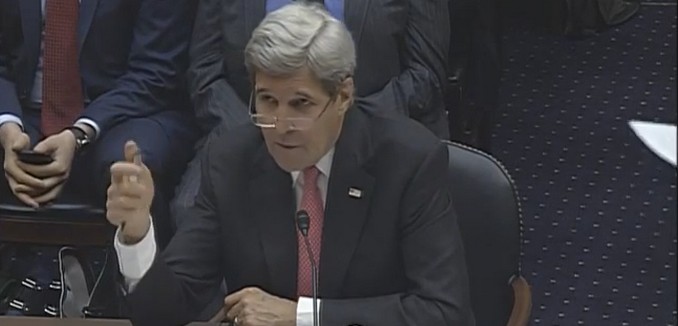Secretary of State John Kerry refused to answer Thursday when asked whether the U.S. would veto Russia’s proposed sale of Sukhoi-30 fighter jets to Iran.
Iran announced that it intended to purchase fighter jets from Russia on February 10. United Nations Security Council Resolution 2231, which endorsed and laid out the nuclear deal, places a five-year arms embargo on Iran, and says that the sale of “combat aircraft” requires the approval of the Security Council “in advance on a case-by-case basis.” In practice, as former National Security Council advisor Michael Singh explained, the United States or one of the other permanent members of the council could veto such a deal. State Department deputy spokesman Mark Toner confirmed last week the sale of the fighter jets would violate the embargo.
However, when asked during testimony before the House Foreign Affairs Committee whether the U.S. would use its veto to prevent the sale, Kerry responded that he had not looked at the specifics of the sale, but that “in principle, we are very concerned about the transfer of weapons….We’ll stay in touch with you.”
Russia and Iran have intensified their regional aggression since the nuclear deal was reached in July. Russia intervened in the Syrian conflict in October to prop up Iran’s long-time ally, dictator Bashar al-Assad. Russia has also said that it will deliver the S-300 air defense missile system to Iran, a move that could alter the balance of power in the region. The International Business Times reported that Russian President Vladimir Putin had said that closer cooperation between Moscow and Tehran “would play a pivotal role in the regional security.” Russia has also reportedly provided sophisticated arms to Iran’s regional proxy, Hezbollah. According the Israeli news site Walla!, the Lebanese terror group received radar technology from Russia that allows it to “lock on” to Israeli jets conducting reconnaissance missions in Lebanon. Hezbollah can then fire missiles at them. “The connection between Hezbollah, Russia and Syria have greatly changed the rules of the game in the region,” An Israeli official told Walla!. It has been reported that Hezbollah receives other weapons from Russia, such as precision ground-to-ground missiles, long-range tactical missiles, laser guided rockets, and anti-tank weapons.




